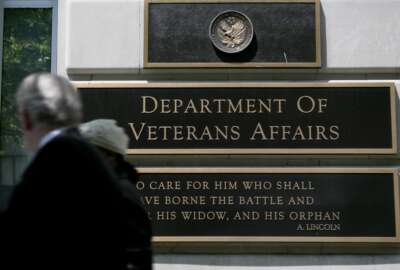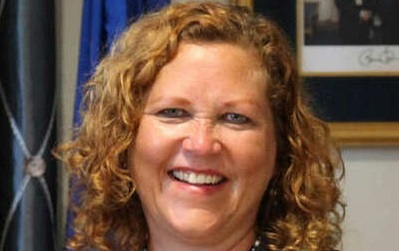
GAO worried foreign adversaries are getting their hands on NIH-funded discoveries
When federal agencies make financial grants to science and technology researchers, scouring their proposals for possible conflicts of interest is a big part of the...
Best listening experience is on Chrome, Firefox or Safari. Subscribe to Federal Drive’s daily audio interviews on Apple Podcasts or PodcastOne.
When federal agencies make financial grants to science and technology researchers, scouring their proposals for possible conflicts of interest is a big part of the process. But some agencies are focused on financial conflicts, and less on guarding against the risks of new scientific discoveries being sent to potential foreign adversaries. That appears to be the case with the National Institutes of Health, according to the Government Accountability Office. Candice Wright is acting director for Science, Technology Assessment, and Analytics at GAO. She talked about the problem with Federal News Network’s Jared Serbu on Federal Drive with Tom Temin.
Interview transcript:
Candice Wright: NIH has had a long standing conflict of interest policy, which we think is certainly a great starting point. Our concern with NIH was specifically that its policy, while it called for grantees to disclose all financial interests, it didn’t specify both foreign and domestic. And we think that specifying those things are really important to making sure that grantees are aware, and the universities are aware of all of the types of information that needs to be disclosed. And so, we made a recommendation to NIH that it really needed to update its policy, particularly its conflict of interest policy, to ensure that grantees are aware to disclose both financial as well as non financial conflicts and then also emphasizing foreign and domestic interest. Since our report issued and in Dec. 2020 when we made that recommendation, NIH has taken steps to update certain applications and forms to have grantees more fully disclose non financial interests, including foreign activities and resources. But we also think that they should take the next step of updating their conflict of interest policies as well.
Jared Serbu: Yeah, and as I understand it, NIHs position on this, at least initially was that, look, we’re already requiring everybody and telling them they must disclose all conflicts of interest, which in their view would include foreign and domestic. Maybe see a few more words about why GAO thinks that’s not adequate.
Candice Wright: Right. So at the time when NIH first developed its policies, there was a great emphasis on domestic interest. However, concerns around foreign influence in federally funded research has continued to grow over the last few years, especially as there’s greater international collaboration. So we think it’s really important that given the changing circumstances, that the policies and the requirements explicitly define what it is that needs to be disclosed, so that there isn’t any question. So yes, one might think that it’s certainly plausible and understandable that when you say disclose all interests, that that would include both foreign and domestic, we just think that given the current environment where there is this great concern, and increasing concern about foreign influence in federally funded research, that it doesn’t hurt to take that added step to explicitly state what the issues are, so that all involved in the research community are clear about what needs to be addressed and what the concerns might be.
Jared Serbu: And NIH certainly is not blind to these risks. As you pointed out in your testimony last week I believe, you characterized their position as being aware that there’s, quote, “a systematic failure to disclose by participants in certain foreign talent recruitment programs.” Those programs, I think, are a subset of the overall potential for foreign influence. But can you say a little bit about what those programs are and why they’re a particular threat here?
Candice Wright: Yeah, so this is something that has come up quite a bit and has been widely reported. At GAO, we haven’t looked explicitly at these foreign talent recruitment programs, but certainly throughout the course of our work heard a great deal of concern about them. For example, the Office of Science and Technology Policy has reported on this, and noted that these programs, certainly a number of them, do exist for legitimate purposes to aid other countries in recruiting science and technology experts in certain fields. However, there are some countries that are using these programs as a way to get access to U.S. research by having people participating in these programs, and providing them salaries and other benefits in exchange for sharing information about what they’re learning on through participation in various U.S. research efforts. And so these countries might be using these programs and researchers who are participating in these foreign talent recruitment program to be able to divert information that is coming from the research that they might be involved in, diverting intellectual property, diverting knowledge, and other kinds of things like that, that could then serve to undermine the integrity of U.S. funded research. We’ve also seen in past years, or I should say heard in past years, that there’s been a great deal of interest for researchers to participate in these kinds of programs. There have been, in the past, considered to be prestigious, but now certainly with more awareness that these programs could be used to divert U.S. research, there’s a little bit more concern, making sure that we have better awareness about these programs, and who may be participating in them. I will say that just participating in the program in and of itself may not be problematic. But it’s important that that information be disclosed, so that the universities and agencies funding these research have the full awareness of people’s involvement, their affiliations, so that they can make decisions about whether the researcher should go forward, given some of these kinds of affiliations with foreign talent recruitment programs.
Jared Serbu: Right. And it seems to me at least one of the issues here is, NIH, or any agency, can do a perfect job of doing due diligence while it’s reviewing grant proposals, but once the check is out the door and the grant has been made, it’s sort of up to the universities to do the policing work on this, right? Because they’re on the ground and NIH, or the grant making agency, isn’t. So what should NIH be doing to better equip universities to be those eyes and ears and watch out for potentially harmful things going on?
Candice Wright: Right. So we certainly found that the NIH relies on the universities to identify any potential financial or non financial conflicts, and to mitigate them. We think that it’s really important for the agencies to make the universities aware of what the current threat environment is, what the potential risks might be, and working with them to be able to identify it. In the course of our work, we actually spoke with a number of principal investigators who lead research at various universities that are receiving grant funding. And a number of them found, or excuse me, told us that they weren’t certain that they had the tools and the knowledge to be able to identify these kinds of foreign talent recruitment programs, and some of them didn’t even know that they existed. So we think that there is certainly a responsibility for the agencies to be making the research community aware of what the threats are, and the risks so that they can be equipped with the appropriate information to help manage those risks.
Jared Serbu: And last thing before we let you go, Candace, we’ve focused a lot on NIH here, just because that was the focus of your testimony last week, but as you alluded to, this is based on a broader report GAO did late last year where you looked at this issue across several different agencies. Are there agencies that are doing this better than others? Are there best practices that that kind of emerged from that work as you looked across the government?
Candice Wright: So we actually looked at the department’s of defense and energy, as well as NASA, NSF, and NIH, for the report that was issued in December. And by and large, we found that NIH and NSF were among the agencies that had agencywide policies. Certainly NASA as well. DoD and DoE did not have agencywide policies, and so as such, we made recommendations that they really think about developing agencywide conflict of interest policies to help address this issue. So the agencies really vary, I would certainly say we thought it was good that NIH, NSF, and NASA all had those agencywide conflict of interest policies. And we made some recommendations around strengthening those policies, as well as strengthening their efforts to address how to enforce these policies, and also how to communicate information to the broader research community so that they are equipped with with the necessary tools, and information and resources to help address this issue.
Tom Temin: Candace Wright, acting director for Science, Technology Assessment, and Analytics at the GAO speaking with Federal News Network’s Jared Serbu.
Copyright © 2025 Federal News Network. All rights reserved. This website is not intended for users located within the European Economic Area.
Tom Temin is host of the Federal Drive and has been providing insight on federal technology and management issues for more than 30 years.
Follow @tteminWFED
Related Stories

NIH chief information officer that guided agency through pandemic inducted as NAPA fellow




